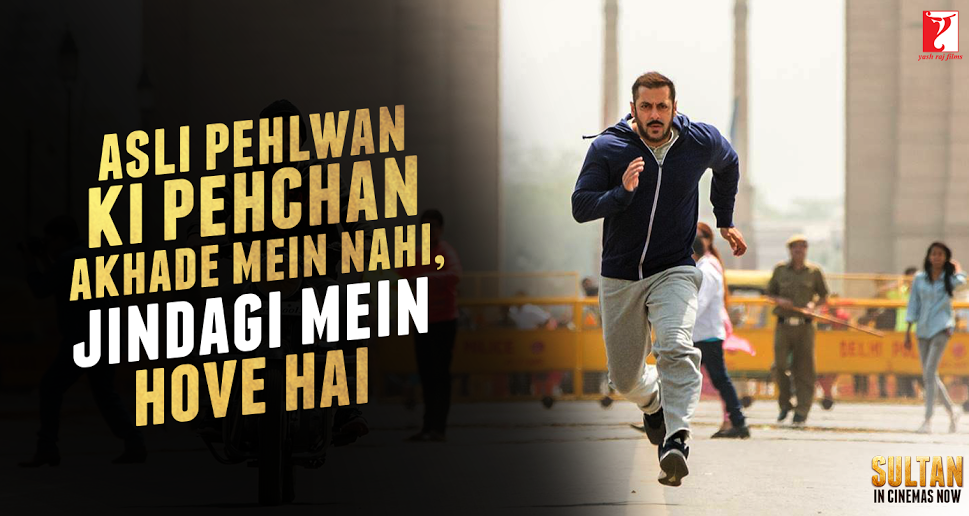
Ali Abbas Zafar has finally struck gold after his past mediocrities, which came in the form of “Gunday” and “Mere Brother Ki Dulhan.” It wouldn’t be fair to solely credit all the success of “Sultan” to Salman Khan, as this wasn’t the usual run of the mill Bhai film, attracting only the Khan’s mass following of smitten fans.
“Sultan” brings to the table a screenplay atypical to ones we associate with sports movies, such as “Bhaag Milka Bhaag” and “Mary Kom.” “Sultan” is not fixated on the plight of a rising athlete, rather the movie delves further into human loss, relationships, and inner struggles. Apart from a refreshing story, “Sultan” also allows the audience to see a Salman Khan we weren’t expecting to see.
Khan movies of the recent past (“Kick,” “Dabangg,” “Wanted,” “Bajrangi Bhaijaan,” etc.) have unfortunately been infamous for casting their female “leads” in less meaty roles. Whether it be Kareena Kapoor, Sonakshi Sinha, or Jacqueline Fernandez, we have been accustomed to seeing these actresses remain on the glamorous sidelines when acting alongside Khan in his movies. A Salman Khan film has been accustomed to being about Khan and Khan only. Thankfully, Anushka Sharma’s character, Aarfa, has broken this norm. Sharma has been known for choosing meaty and substantial roles, and this time is no different. She shines neck to neck with her costar Khan, as she has done in the past with Shahrukh Khan and Aamir Khan.
In a recent interview with Sharma, Anupama Chopra mentions how reviews of “Sultan” have been slamming labels of sexism despite Chopra seeing Aarfa’s character as a “heroine with heft and voice.”
“Sultan” touches on a sensitive topic of pregnancy and abortion, and subsequently, having Aarfa choose her child and husband while letting her dream sit on the back burner did not settle well with some. Sharma responds:
If a woman is making a choice on her own, that is definitively something that is not regressive.
She proves that the ability to make the choice of whether a woman has an abortion or not is empowering on its own.
“Sultan’s” core was not similar to the normal Salman Khan movie; director Ali Abbas Zafar depicts human emotions of loss and guilt as we see Sultan and Aarfa lose a child, and what damage this loss has done to both their relationship and themselves. Though we see Sultan training and fighting international athletes, the audience soon realizes the most significant fight is one that Sultan is battling within himself. Sultan gives us the lens of seeing a Salman Khan that is not the perfect hero, whose sole purpose is to fight the bad guys.
In fact, Sultan’s character is by no means a hero at all. At last, we see a Khan character who is not putting up a façade of playing a twenty-something year old as Zafar pens Sultan to be forty years old when he is trying to get back in the ring. A male actor to be playing a character closer to his true age is a rarity in Bollywood; however, Khan has been continuing to stick to characters and screenplays which do not force him to portray a personal that is too far from reality.
Despite being a Salman Khan film, it was enjoyable to watch him play a character that cracks, bleeds, and cries. As a result, we see Khan as a relatable character and not one that is filled with “Bhai-giri” antics. Hats off to the screenplay of “Sultan” for allowing the audience to see a Bollywood film that shatters elements of their predecessors: empowerment through abortion, a heavyweight (no pun intended) role for the heroine, and a self-castigated male lead.
Zaynah Arefin is known as a Houstonian-New Yorker. She is a New Yorker in the truest of senses but thanks to that little thing called love she now resides in Texas. Arefin is probably the desi-est of the desis. She has a passion for writing and an even more intense love for all things Bollywood! She also hopes to connect with all of you filmy folk through Brown Girl Magazine! After all, who run the world? Brown girls!




